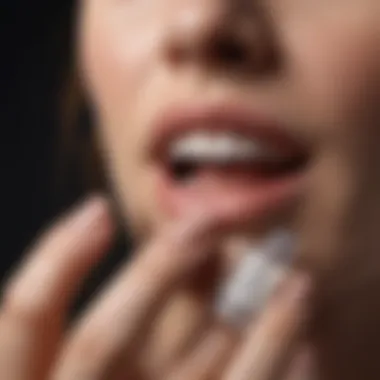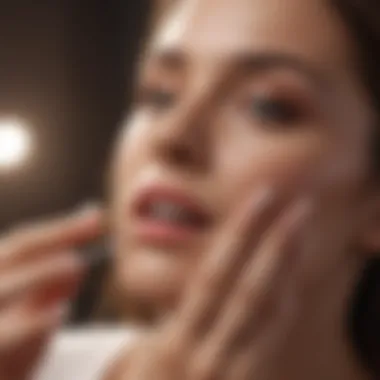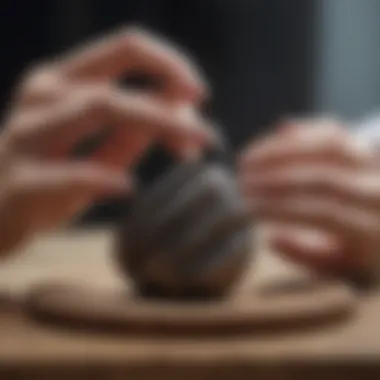Mastering the Art of Halting Nail Biting: Your Ultimate Guide


Beauty Tips and Tricks
In the realm of nail care, addressing the common habit of nail-biting is essential for achieving healthier nails. While there are various techniques and strategies, the focus on enhancing nail health is paramount. Understanding the underlying reasons for nail-biting is crucial in overcoming this habit, leading to improved nail growth and appearance.
Skincare Routine Tips
Incorporating a mindful skincare routine can also contribute to healthier nails. Ensuring proper hydration and nourishment not only benefits the skin but also strengthens nails, making them less prone to damage.
Haircare Hacks
Interestingly, haircare practices can indirectly impact nail health. Consuming a balanced diet rich in nutrients vital for hair and nail strength, such as biotin and zinc, can be beneficial in curbing nail-biting tendencies.
Product Reviews
While nail-biting may seem unrelated to beauty products, selecting certain nail treatments or polishes that discourage nail-biting behavior can be advantageous. Exploring various products designed to promote nail growth and discourage nibbling can be a proactive step in addressing this habit.
Skincare Product Reviews
Some skincare products contain ingredients that can inadvertently deter nail-biting, creating a less appealing taste on the nails. Integrating such products into regular nail care routines may aid in breaking this habit.
Makeup Product Reviews
Certain nail polishes are specifically formulated to discourage nail-biting, providing a bitter taste upon contact with the nails. This can act as a deterrent and help individuals become more conscious of their habit.
Makeup Trends
While makeup trends may not directly address nail-biting, they can serve as a form of expression and confidence-boosting, ultimately supporting individuals in their journey towards overcoming this habit.
Seasonal Makeup Trends
Exploring seasonal makeup trends can be a fun distraction for individuals striving to break free from nail-biting. Focusing on creative makeup looks can shift attention away from this habit and towards self-expression.
Expert Beauty Advice
Receiving guidance from industry professionals can provide invaluable insights on how to stop biting nails. Skincare specialists or wellness experts may offer tailored recommendations to address underlying triggers causing nail-biting behavior.


Professional Makeup Artist Insights
Professional makeup artists often emphasize the importance of self-care and mindfulness in beauty routines. Their advice extends beyond makeup application, encompassing holistic approaches to overall well-being.
Beauty Industry News
Staying informed about the latest beauty industry news can offer inspiration and motivation in the journey towards healthier nails. Updates on product launches, beauty events, and collaborations can engage individuals in the ever-evolving world of beauty.
Product Launch Updates
Keeping track of new product launches in the beauty industry can introduce individuals to innovative solutions for nail-biting. Exploring these launches may lead to discovering effective products to support nail health and break the habit.
Celebrity Beauty Collaborations
Celebrities often partner with beauty brands to launch products that promote self-care and well-being. Engaging with celebrity beauty collaborations can provide individuals with motivation and inspiration to prioritize nail health and break the cycle of nail-biting.
Understanding Nail Biting
In the realm of nail care, understanding the habit of nail-biting holds paramount importance. By delving into the roots of this behavior, individuals can embark on a journey towards healthier nails and improved self-care practices. Nail biting is often a manifestation of underlying issues such as stress, anxiety, and ingrained habits. Recognizing these triggers is instrumental in developing effective strategies to overcome this common challenge.
Causes of Nail Biting
- Stress and Anxiety: Stress and anxiety serve as notable instigators of nail biting behavior. The incessant worries and pressures of daily life can manifest physically through the act of nail chewing. Understanding the interplay between stressors and nail biting is imperative for devising personalized solutions to mitigate this habit. While biting nails may provide temporary relief, the long-term repercussions on nail health and overall well-being necessitate proactive intervention.
- Boredom and Inactivity: Boredom acts as a silent accomplice to nail biting, often tempting individuals to engage in this habit as a means of distraction. In moments of monotony or idle time, the subconscious urge to bite nails may surface, leading to a cycle of reinforcement. Addressing the underlying causes of boredom and identifying productive alternatives to nail biting are crucial steps in breaking free from this behavioral pattern.
- Habitual Behavior: Habitual nail biting transcends mere physical action to become deeply ingrained behavior. The repetitive nature of this habit reinforces neural pathways, making it a challenging pattern to disrupt. Unpacking the triggers and rewards associated with nail biting is essential for dismantling this routine. By cultivating awareness and introducing intentional actions, individuals can gradually replace this habit with healthier coping mechanisms.
Effects of Nail Biting
- Damage to Nails and Skin: Nail biting poses a significant risk to the integrity of nails and surrounding skin. The continuous pressure and moisture exposure weaken the nail structure, making them prone to breakage and deformities. Additionally, the constant contact between teeth and nails can cause abrasions and potentially lead to infections. Prioritizing nail health through proper care and maintenance is crucial for reversing the detrimental effects of nail biting.
- Risk of Infections: The habit of nail biting introduces bacteria and fungi from the mouth to the nail bed, increasing the likelihood of infections. Microorganisms thrive in moist environments, making chewed nails a breeding ground for pathogens. Moreover, the broken skin around the nails becomes susceptible to entry by harmful germs, escalating the risk of localized or systemic infections. Vigilance in cleansing and protecting the nails is paramount for preventing microbial-related complications.
- Social Implications: Beyond the physical consequences, nail biting can impact one's social interactions and self-image. Visible signs of nail damage may influence perceptions of hygiene and grooming, potentially affecting professional and personal relationships. Individuals who struggle with nail biting may experience embarrassment or self-consciousness, leading to avoidance of social activities that draw attention to their hands. By addressing the underlying causes and adopting corrective measures, individuals can regain confidence and present well-groomed nails to the world.
Techniques to Stop Nail Biting
In this comprehensive guide on how to stop biting your nails, the section on Techniques to Stop Nail Biting plays a pivotal role. Nail biting, scientifically known as onychophagia, is a common habit that can lead to various negative consequences such as damage to nails and skin, risk of infections, and social implications. By understanding and implementing effective techniques to curb this habit, individuals can significantly enhance the health and appearance of their nails.
Identify Triggers
Recognizing Patterns


Recognizing Patterns is a fundamental aspect when aiming to stop nail biting. This involves identifying specific triggers or situations that prompt the urge to bite nails. By acknowledging and understanding these patterns, individuals can take proactive steps to avoid or manage them effectively. Recognizing Patterns is a key tool in breaking the habit of nail biting, as it empowers individuals to preemptively address situations that may lead to this behavior. The advantage of focusing on Recognizing Patterns lies in its ability to provide valuable insights into personal triggers, enabling individuals to develop tailored strategies for combating nail biting.
Understanding Emotional Triggers
Understanding Emotional Triggers delves into the emotional component of nail biting behavior. Emotions like stress, anxiety, boredom, or insecurity can act as triggers for nail biting. By unraveling the emotional aspects behind this habit, individuals can gain a deeper understanding of why they engage in nail biting. Understanding Emotional Triggers equips individuals with the knowledge to address the root causes of their behavior, leading to more effective strategies for cessation. While this aspect requires emotional introspection, it is crucial in developing long-lasting solutions to combat nail biting.
Find Substitutes
Chewing Gum or Snacks
Chewing Gum or Snacks serve as viable substitutes for nail biting, offering individuals a tactile sensation or oral fixation similar to biting nails. This alternative behavior helps redirect the urge to bite nails towards a more harmless activity. The key characteristic of Chewing Gum or Snacks lies in their ability to occupy the mind and mouth, thereby reducing the inclination to bite nails. While exploring this substitution, individuals should be mindful of choosing healthy snack options to prevent unwanted side effects.
Fidget Toys
Fidget Toys present another effective substitute for nail biting, especially for individuals who benefit from sensory stimulation. These toys offer both a physical and cognitive distraction, diverting attention away from nail biting tendencies. The unique feature of Fidget Toys is their interactive nature, which encourages engagement and focus. By incorporating Fidget Toys into daily routines, individuals can successfully replace nail biting with a more constructive and engaging behavior.
Keep Nails Trimmed and Manicured
Regular Nail Care Routine
Maintaining a Regular Nail Care Routine is essential for individuals looking to break the nail-biting habit. By keeping nails trimmed and neat, there is less temptation to bite or pick at them. This routine not only enhances the aesthetics of nails but also promotes healthy growth. The key characteristic of a Regular Nail Care Routine is its simplicity and effectiveness in discouraging nail biting. While cultivating this habit, individuals should prioritize gentle care to prevent damage or weakening of the nails.
Use of Nail Strengtheners
Incorporating Nail Strengtheners into one's nail care regimen can fortify the nails, making them less prone to damage from biting. These strengtheners provide an added layer of protection, promoting nail health and resilience. The unique feature of Nail Strengtheners is their ability to improve nail quality over time, reducing the likelihood of breakage or flaking. While utilizing nail strengtheners, individuals should follow proper application guidelines to maximize their benefits and support nail growth.
Apply Bitter-Tasting Nail Polish
Deterring Nail Biting Behavior
Applying Bitter-Tasting Nail Polish is a strategy aimed at deterring nail biting behavior. The unpleasant taste serves as a deterrent, creating a negative association with biting nails. The key characteristic of this approach is its simplicity and immediate impact on breaking the habit. By consistently applying bitter-tasting nail polish, individuals can condition themselves to refrain from nail biting. While effective, it is essential to choose high-quality products to ensure safety and avoid any adverse reactions.
Developing Healthy Habits
Developing healthy habits is a cornerstone in the journey to overcome nail-biting and achieve healthier nails. It plays a vital role in reinforcing positive behavior and ensuring long-term success in breaking the habit. By establishing a consistent routine that prioritizes self-care and mindfulness, individuals can cultivate a mindset that promotes nail health and overall well-being. Consistency is key when developing healthy habits, as it strengthens resolve and instills discipline. Moreover, integrating self-care practices and seeking support from friends and family can provide a solid foundation for those looking to kick the nail-biting habit. Establishing a routine that encompasses these elements sets the stage for sustainable progress and improvement.


Establishing a Routine
Self-Care Practices
Self-care practices are integral in nurturing the mind and body to support the journey of overcoming nail-biting behavior. These practices involve taking time for oneself, engaging in activities that promote relaxation and stress relief, and prioritizing mental and emotional well-being. Incorporating self-care rituals, such as indulging in a skincare routine, practicing meditation, or participating in hobbies that bring joy, can help individuals channel their energy towards positive habits. The key characteristic of self-care practices lies in their ability to foster self-love and improve self-esteem, creating a positive mindset that can counteract the impulse to bite nails. While self-care practices vary for each individual, their universal benefit lies in promoting self-awareness and building resilience against triggers that may lead to nail-biting.
Mindfulness Techniques
Mindfulness techniques involve cultivating awareness of the present moment, acknowledging thoughts and feelings without judgment, and practicing acceptance. These techniques play a pivotal role in combating nail-biting by enhancing self-control and redirecting focus towards constructive behaviors. The key characteristic of mindfulness techniques is their effectiveness in breaking the cycle of habituated nail-biting impulses, offering individuals a pause to reconsider their actions and choose healthier alternatives. By integrating mindfulness practices into daily routines, individuals can develop a heightened sense of self-awareness and control over their behaviors, reducing the likelihood of succumbing to nail-biting urges. While mindfulness requires practice and patience, its benefits in promoting mindfulness and emotional regulation are invaluable in the journey to stop biting nails.
Seeking Support
Friends and Family
Friends and family can serve as a strong support system for individuals striving to end the nail-biting habit. Their understanding, encouragement, and accountability can aid in maintaining motivation and staying committed to the goal of achieving healthier nails. The key characteristic of seeking support from friends and family is the sense of camaraderie and connection it fosters, providing individuals with a network of positivity and reinforcement. By sharing progress, setbacks, and experiences with loved ones, individuals can feel supported and understood, creating a conducive environment for personal growth. Despite its advantages, seeking support from friends and family may come with challenges, such as navigating differing opinions or managing expectations. However, the benefits of having a reliable support system outweigh the potential drawbacks, offering emotional guidance and companionship in overcoming nail-biting tendencies.
Therapeutic Interventions
Therapeutic interventions encompass professional help and guidance from mental health professionals or therapists specialized in habit formation and behavior modification. These interventions are tailored to address underlying psychological factors contributing to nail-biting behavior, providing individuals with tools and strategies to combat impulses effectively. The key characteristic of therapeutic interventions is their comprehensive approach to tackling nail-biting by delving into the root causes and triggers that fuel the habit. By engaging in therapeutic sessions, individuals can gain insight into their behavior patterns, develop coping mechanisms, and work towards sustainable recovery. While therapeutic interventions require commitment and openness to change, their advantages in offering customized support and long-term solutions for nail-biting make them a valuable resource in the journey towards healthier nails.
Tracking Progress and Staying Motivated
In the journey to stop nail-biting, it is vital to track progress and maintain motivation throughout. By monitoring your advancements, you can gain insights into your behavioral patterns and triggers, aiding in the development of effective strategies. Noting your milestones provides a sense of accomplishment, bolstering your resolve to continue on the path to healthier nails. Staying motivated is a long-term commitment, requiring perseverance and dedication. It's about acknowledging even small victories and using them as fuel to propel yourself further. Without monitoring progress and staying motivated, the efforts to stop nail-biting may become stagnant and ineffective.
Utilizing Apps and Tools
Habit-Tracking Apps
Integrating habit-tracking apps into your journey of overcoming nail-biting can be highly beneficial. These apps allow you to record your nail-biting episodes, identify patterns, and analyze trends over time. They offer a structured approach to tracking progress, providing visual representations of your habits. Being able to visualize your behavior can be a powerful tool in bringing about positive changes. Habit-tracking apps also often come with reminders and notifications to help you stay on track, ensuring consistency in your efforts. While these apps can be insightful and motivating, it's essential to choose one that aligns with your preferences and goals, ensuring a seamless experience throughout your nail-biting cessation journey.
Goal-Setting Techniques
Setting goals is paramount in any self-improvement endeavor, including overcoming nail-biting. Establishing clear and achievable goals provides direction and focus, guiding you towards success. Goal-setting techniques help break down the larger goal of stopping nail-biting into smaller, manageable steps. This approach makes the process less overwhelming and more attainable. By setting specific, measurable, achievable, relevant, and time-bound (SMART) goals, you create a framework for measuring progress and celebrating achievements. Goal-setting techniques not only keep you accountable but also serve as a source of motivation, pushing you to strive for continual improvement.
Rewarding Yourself
Celebrating Milestones
Celebrating milestones in your journey to stop nail-biting is essential for maintaining motivation and fostering a positive mindset. Marking significant achievements, such as going a certain number of days without biting your nails, reinforces your success and builds confidence. Celebrations can vary from small gestures like treating yourself to something you enjoy to more elaborate rewards for reaching major milestones. By acknowledging and celebrating your progress, you create a culture of positivity around your efforts, making the process more fulfilling and sustainable.
Incentivizing Progress
Incentivizing progress involves creating rewards or incentives tied to specific milestones or goals in your nail-biting cessation journey. These incentives serve as motivators, enticing you to stay committed and persistent. By linking rewards to your achievements, you establish a sense of value and significance in overcoming challenges. Incentivizing progress can be personalized to suit your preferences, making the journey more engaging and rewarding. However, it is vital to select incentives that align with your goals and do not undermine the progress you have made. Balancing incentives with intrinsic motivation is key to fostering a sustainable habit change and reaping long-term benefits.







